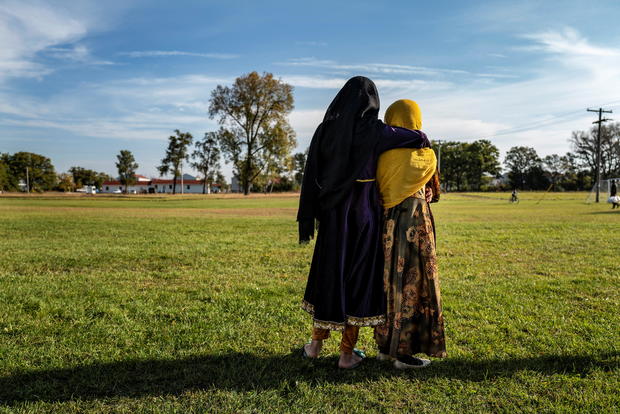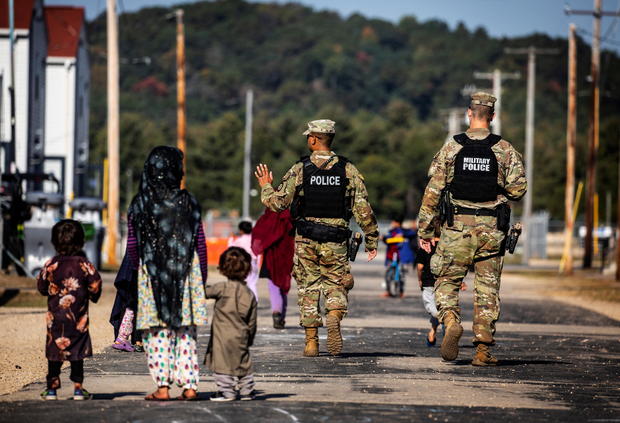Afghan evacuees face uncertain legal status as they prepare to leave U.S. bases
Tens of thousands of Afghan evacuees who are set to leave U.S. military sites in the next few weeks to start new lives in communities across America will face an unresolved question: what legal status will I have here?
Because they entered the U.S. under a temporary legal process known as parole — and not as traditional refugees or visa holders — many at-risk Afghans brought to America following the swift Taliban takeover of their homeland do not have a direct avenue to obtain permanent residency.
Since mid-August, more than 55,000 Afghans have been relocated to the U.S., according to Department of Homeland Security (DHS) figures provided Wednesday. The department said it determined that at least 40% of evacuees are eligible for special immigrant visas because they aided the U.S. war effort.
Between July and September, nearly 5,400 Afghans entered the U.S. with special immigrant visas, which allow recipients and their spouses and children to become permanent residents, according to government data. DHS said other evacuees have pending special visa applications, but did not provide a number.
Unless Congress creates a legalization program for them, Afghan evacuees who are not eligible for special immigrant visas will likely have to request asylum, and join more than 400,000 asylum-seekers in the U.S. with pending applications, to gain permanent status.
"We evacuated them here. We did that. It's not very equitable to force people to stay in this limbo state," said Meredith Owen, policy director at Church World Service, one of nine national refugee resettlement groups in the U.S.
The U.S. is currently housing 53,000 Afghans at eight domestic military sites, where they have been undergoing vaccinations against measles, chicken pox, polio and COVID-19, according to DHS figures. The department announced this week that 49,000 evacuees had completed their vaccinations and were ready to depart after a 21-day waiting period recommended by public health officials.
More Afghans are expected to arrive in the coming days, too, since the U.S. on Tuesday lifted a three-week pause on evacuee flights that was triggered by the detection of a handful of measles cases among the new arrivals. There are currently 15,000 evacuees at military bases in Europe and the Middle East, according to DHS data.
Through a stopgap funding bill that President Biden signed into law last week, Congress made Afghan evacuees eligible for traditional refugee benefits, like Medicaid and direct assistance to purchase basic necessities like food and housing. But instead of allowing them to apply for permanent residency, as the Biden administration asked for, Congress created what is supposed to be an expedited asylum process.
Congress instructed the U.S. Citizenship and Immigration Services (USCIS) to interview Afghan evacuees no later than 45 days after they file an asylum petition and to generally issue a final decision within a 150-day timeframe.
But refugee resettlement officials expressed concern that U.S. officials may not be able to meet the time limits, stranding Afghans in the backlogged asylum pipeline. Evacuees will also face difficulty finding lawyers to help them navigate the convoluted asylum application process and may not have the necessary documents to win their cases, the officials said.
"Some families destroyed paperwork based on U.S. Embassy instructions, knowing these documents could be a death warrant if found by the Taliban. And of course, these are the same papers that are required for seeking asylum," Krish O'Mara Vignarajah, president of the Lutheran Immigration and Refugee Service, told CBS News.
To gain U.S. asylum, applicants must prove that they were persecuted, or fear persecution, in their home country due to their religion, race, nationality, political views or membership in a social group.
Quickly processing thousands of petitions from Afghan evacuees could prove to be a herculean task for the 800-person asylum officer corps at USCIS, which is already reviewing 404,000 applications and screening thousands of migrants seeking protection at the southern border each month.
In fiscal year 2019, the last one with publicly available statistics, USCIS approved fewer than 28,000 asylum applications, including just 82 petitions filed by Afghans.
It's unclear what would happen to Afghans who lose their asylum cases. If they no longer have parole, they could be placed in deportation proceedings, but the U.S. has not carried out a deportation flight to Afghanistan since late 2020.
USCIS did not respond to multiple questions about how it plans to speed up the adjudication of asylum claims from Afghan evacuees. The spending law Mr. Biden signed last week granted USCIS $193 million in funds to support the processing of Afghan allies.
Congress may still be able to place Afghan evacuees on a pathway to green card status, but it's unclear whether enough Republican lawmakers would back the creation of a legalization program, even for a group of immigrants whose resettlement in the U.S. enjoys broad bipartisan support.
Refugee advocates are pushing lawmakers to include an Afghan legalization program in upcoming must-pass legislation, including the National Defense Authorization Act or an omnibus spending bill.
In addition to questions about evacuees' legal status, resettlement officials said they are also concerned about finding housing for tens of thousands of Afghans, especially in areas like northern California and the Washington, D.C., suburbs, where affordable housing is limited.
Convincing landlords to rent to newcomers with no U.S. credit and who are not yet employed has been a major challenge, resettlement officials said.
California and Texas are slated to receive the highest number of at-risk Afghans, according to estimates the Biden administration provided to governors last month.
"In some ways, this is the calm before the storm," said Vignarajah, the resettlement official.






